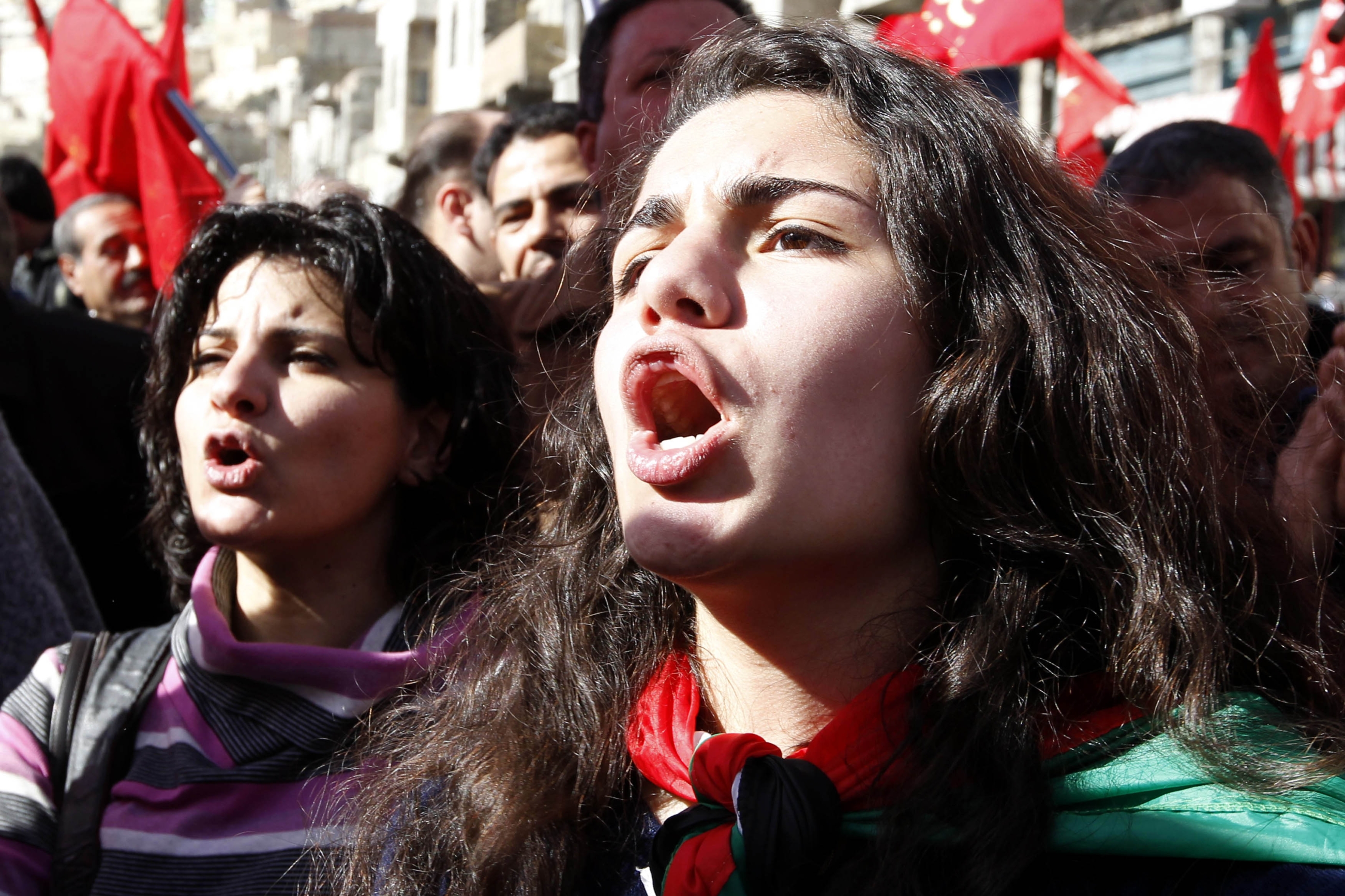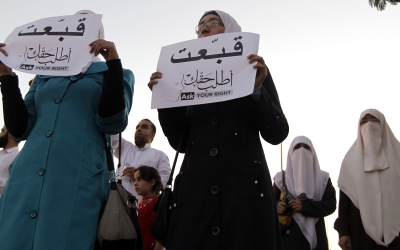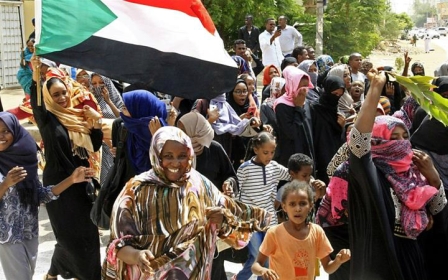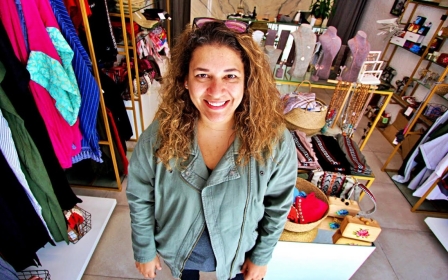Jordanian women fear violence at work despite reforms, report warns

One in five women in Jordan faces sexual harassment and violence in the workplace, according to a new report released by rights group Action Aid on Wednesday.
Over the last two decades, the Jordanian government has been committed to women’s rights and increasing female participation in the workplace.
Still, only 15.8 percent of women enter the workforce, despite relative gender equality in educational achievement in Jordan.
The report suggests that a fear of violence against women at work could be a key factor in preventing women from taking up employment in the country.
Social, institutional and material barriers get in the way of women feeling safe at work and achieving justice against violations committed at the workplace, according to the UK-based rights group.
New MEE newsletter: Jerusalem Dispatch
Sign up to get the latest insights and analysis on Israel-Palestine, alongside Turkey Unpacked and other MEE newsletters
Issues highlighted by women at work included unwanted staring; verbal sexual harassment; unwanted messages; touching and gestures; stalking; and unwanted invitations of a sexual or romantic nature.
The more precarious or informal the work, the higher the risk of women facing violence and sexual harassment. Interns and daily wage workers faced the highest rate of violence at work, Action Aid found.
Women in Jordan tend to usually work in such informal roles, especially those from poorer or marginalised backgrounds.
In 2011, approximately 44 percent of the Jordanian economy was made up of informal work, highlighting the significant scale of women and girls at risk. Action Aid’s research found that “in the largest pool of women at work in Jordan – 21-25 percent have experienced one or more forms of violence.”
However, where women were found in more formal roles, such as those with permanent contracts and in management, only 3-4 percent reported experiencing violence at work.
Unsafe and poor public transport is one of the most common reasons cited for women to not join the workforce. Many women complain that much of the harassment they receive occurs while they are travelling to and from work.
A female resident of the city of Karak said women have to take extra precautions when taking public transport.
“If we had no choice but minibus, we have to choose the suitable minibus… the driver should be an old man, and the windows shouldn’t be covered with curtains,” she said.
Another woman explained that men harass those women who they think will be afraid of speaking up.
“The girls avoid buses more than taxis. In the bus, the young men harass girls who feel shy to talk about that. One time, a young man harassed a girl in an Amman bus and the girl told her friends after she left the bus, and I told her why didn’t you kick him? Young men harassed her and she kept silent.”
Shame, stigma and backlash
The report also revealed that migrant Arab women were at particular risk in a work environment, with one in three reported to have experienced violence. Jordan is home to millions of Palestinian refugees and has also been on the frontline for Syrian refugees since the beginning of the war, as well as hosting refugees from Yemen, Iraq and Sudan.
Refugees and women from poorer backgrounds do not have the means to achieving justice if they are a victim of violence or sexual harassment. They are often burdened with livelihood securities or they may have surpassed social gender norms by working in the first place.
In such situations, matters are made worse if the employer is more powerful than the woman in the community.
“If [violence] happens at the workplace, he can increase her work hours and reduce her salary. To pressure her [to keep silent],” a woman interviewed for the study explained.
The study found that nearly a third (29 percent) of women kept silent about the violence and harassment they experienced at work and only 14 percent of women survivors resigned afterwards. Seventeen percent feared that revenge would be taken against them.
Social norms coupled with a lack of trust in the judicial system prevent women from reporting such crimes against them.
Women fear the stigma associated with sexual harassment and will not report incidents of violence against them. Family and friends will encourage them to keep silent instead of facing local gossip and scandals that will undermine their position in society.
Women are also fearful of a potential backlash in terms of physical safety towards them. This might come from male family members if they reported an incident.
One woman that spoke to Action Aid recalled an example of a vulnerable survivor who was punished for being harassed.
“There was this girl who had some mental health issues and used to walk far distances. People said she was being subjected to harassment. Her family locked her up and beat her up. They didn’t go to court but kept her locked up and beat her,” the woman said.
Poverty, illiteracy and physical restrictions on getting to police stations or courts further limit their access to justice, while some men spoken to by Action Aid suggested that some women were inviting trouble due to a lack of modesty.
One man that was quoted in the report said: “The woman should respect the freedom of others, so she should take into account her clothes, her behaviours, or her way of talking. All of that should be proper and decent.
"We should blame the young men, but at the same time, if the woman did not open the door to him, he will avoid her. There are many women in the street, why would the young man choose a certain woman? He chooses her because she does something wrong.”
Failed justice for women
Some women said they were also concerned that reporting violence against them might result in themselves being charged with perjury or even jailed.
A female legal aid provider explained the injustices within the legal framework.
“When some women approach the family department with an issue, sometimes they get intimidated or threatened by staff that if anything is wrong or inconsistent in their statement then they can be imprisoned for perjury. This scares women and girls off. The system is not helping vulnerable women.”
In more traditional communities, women who have been subjected to violence will be encouraged to use the "traditional justice system". This would mean seeking out the advice of elders, mostly men, to help resolve the matter.
Women are not confident that they will be protected, nor that justice will be achieved through this system.
“Traditional justice culture does not protect women or provide justice. It exposes them to discrimination and potentially further violence,” the report said.
In 2019, the United Nations High Commissioner for Human Rights pointed out that violence against women in the world of work is widespread and a major impediment to their enjoyment of fundamental rights.
Jordan has outlined as part of its "Vision 2025" the need to overcome the gap in female employment as essential to achieving stable and sustainable economic growth. The aim is to increase women’s labour force participation from 15.8 percent to 24 percent.
But the report said that the government and employers needed to make serious investments to protect women’s safety in the workplace and while travelling to work to achieve this.
Middle East Eye delivers independent and unrivalled coverage and analysis of the Middle East, North Africa and beyond. To learn more about republishing this content and the associated fees, please fill out this form. More about MEE can be found here.






